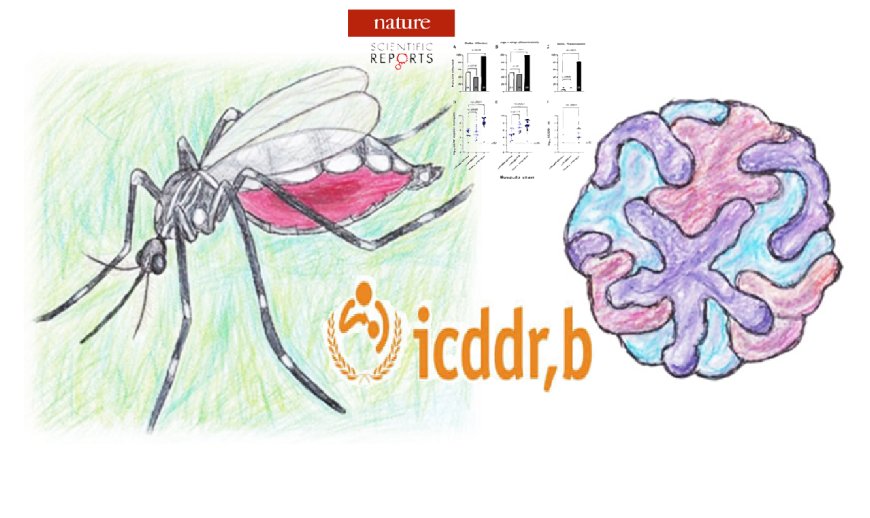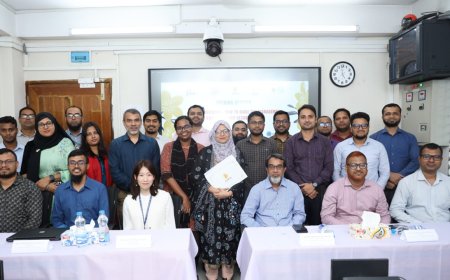Mosquito Miracle: Breakthrough Brings Hope for Bangladesh in Dengue Fight

A major scientific breakthrough is offering new hope for Bangladesh in its battle against dengue. An international team of researchers has successfully developed a strain of Aedes aegypti mosquitoes infected with Wolbachia bacteria, which are capable of adapting to the local environment of Dhaka city. Dubbed as “good mosquitoes,” this innovation opens a new, safe, and biological pathway for controlling the spread of dengue and other mosquito-borne arboviral diseases in the country, according to the International Centre for Diarrhoeal Disease Research, Bangladesh (icddr,b).
The research team includes scientists from QIMR Berghofer Medical Research Institute in Australia, the University of Queensland, icddr,b, and the United States Centers for Disease Control and Prevention. The findings were recently published in the journal Nature’s Scientific Reports.
According to icddr,b, dengue has emerged as a severe public health threat in Bangladesh. In 2023 alone, a record 321,000 people were infected, with more than 1,700 deaths—making it the deadliest year on record. Rapid urbanization, erratic rainfall, and rising temperatures have contributed to the spread of Aedes mosquitoes, the primary vector of dengue. Simultaneously, the effectiveness of conventional insecticide-based mosquito control methods is declining due to growing resistance among mosquito populations. This has prompted scientists worldwide to seek more sustainable solutions, with the use of "good mosquitoes" being one of the most promising.
Researchers explained that Wolbachia was chosen because it prevents Aedes mosquitoes from transmitting dengue, chikungunya, and Zika viruses, without harming humans or the environment. Wolbachia is a naturally occurring bacterium found in butterflies, fruit flies, and some mosquito species, though not in Aedes aegypti. This bacterium cannot infect humans or animals, nor is it transmissible through bites or contact.
The study outlines two main strategies for deploying Wolbachia-infected mosquitoes. The first is a suppression method, in which only male “good mosquitoes” are released into the environment. These males mate with wild females, but the resulting eggs do not hatch, thereby reducing mosquito populations. The second is a replacement method, where both male and female “good mosquitoes” are released. The infected females then pass Wolbachia to their offspring, regardless of the infection status of the male. Over time, this results in the replacement of wild mosquito populations with Wolbachia-carrying ones. Both strategies have achieved notable success in several countries.
In northern Queensland, Australia, the replacement method has led to a 96 percent reduction in dengue cases over the past decade. Trials in Indonesia, Brazil, Colombia, Malaysia, Singapore, and the United States have also reported up to 95 percent success in mosquito population control.
The research team evaluated the dengue-blocking capacity of the mosquito strain and found that Wolbachia-infected mosquitoes had a 92.7 percent lower ability to transmit the dengue virus compared to their uninfected counterparts. In controlled laboratory conditions, the team also measured various factors such as fecundity (number of eggs), fertility (hatching rate), and survival rate (mortality after 28 days). Results showed that the “good mosquitoes” adapted for Dhaka performed comparably to local mosquitoes in terms of survival and reproduction, making them suitable candidates for environmental release.
Dr. Mohammad Shafiul Alam, a scientist at icddr,b, stated, “Concerns about releasing mosquitoes into the environment are natural, but these are not genetically modified. These are good mosquitoes that carry a natural bacterium. Research shows they are not harmful but beneficial. Wolbachia has been safely used in many countries and can open a new defensive path for Bangladesh against dengue and similar viruses.”
Lead author of the study, Hasan Mohammad Al-Amin, remarked, “This research has laid the foundation for field-level trials in Bangladesh. While the lab results are promising, large-scale implementation will require careful planning and testing. Besides dengue, these good mosquitoes may help control other emerging viral infections. Wolbachia has also proven effective in preventing Zika and chikungunya virus transmissions.”
Dr. Tahmeed Ahmed, Executive Director of icddr,b, said, “We are prepared to support the government of Bangladesh in further trials necessary for the successful application of this promising Wolbachia-based method. Only after successful field testing should widespread environmental release be considered. We have also made notable progress in dengue vaccine research and are optimistic about working with the government to accelerate local access to vaccines, which could provide a comprehensive solution to the country’s dengue crisis.”









































































































































































































